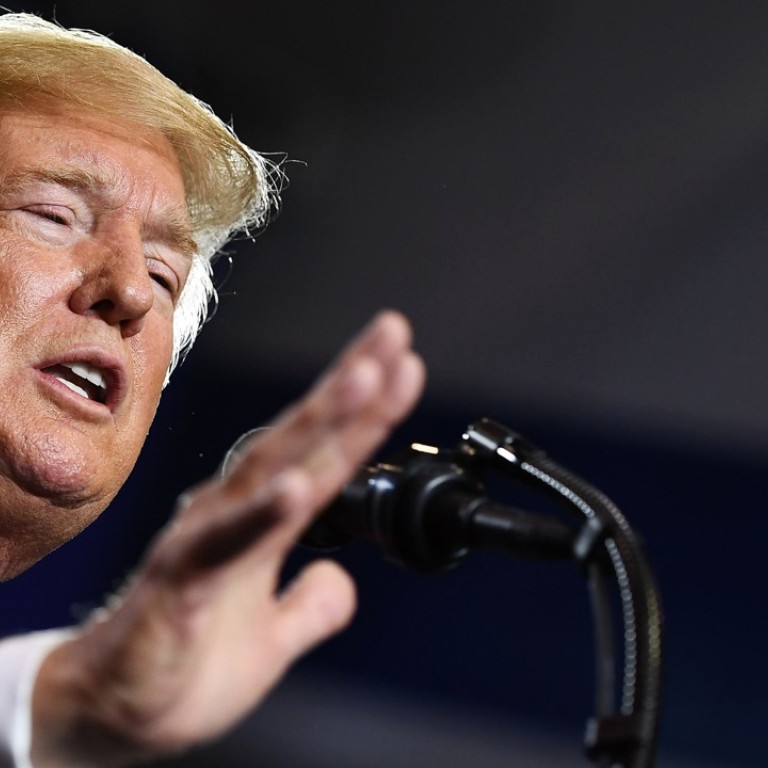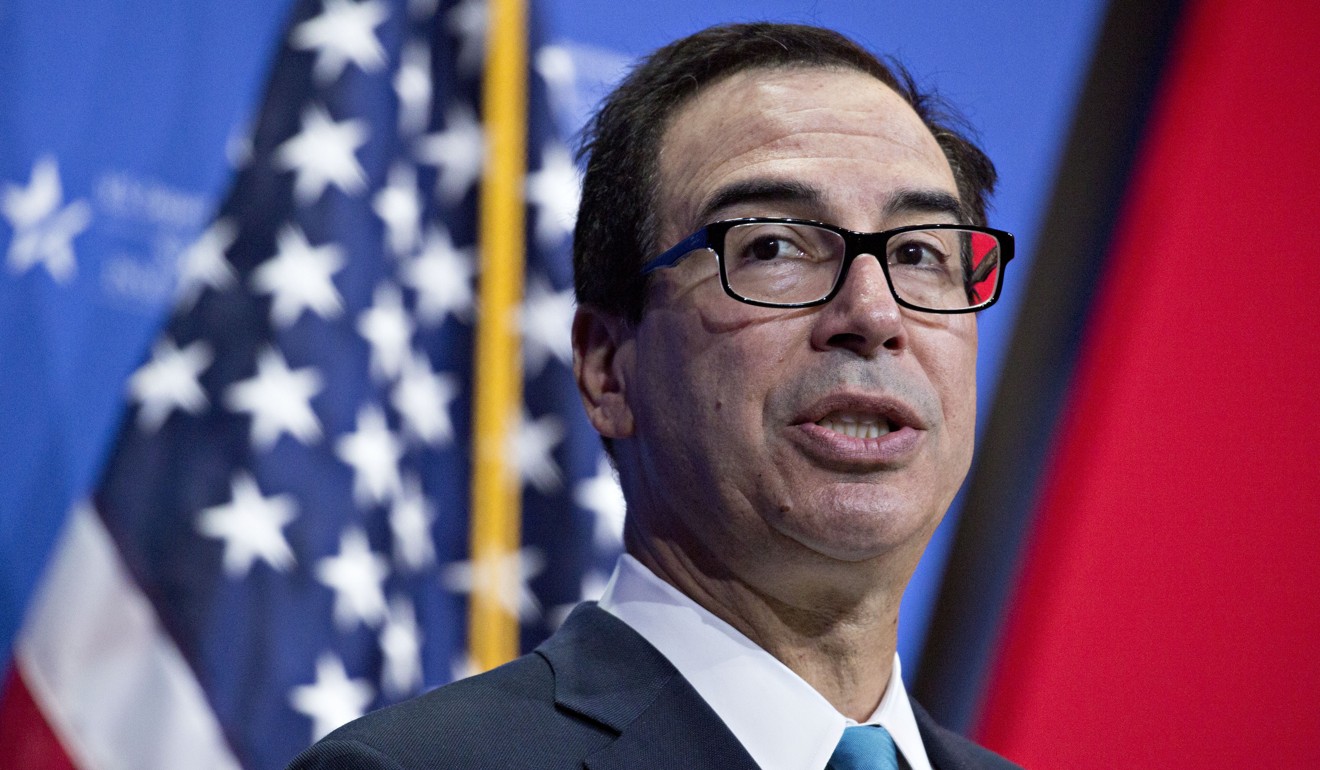
Donald Trump softens threat of new curbs on Chinese investment in US firms
He said his administration would rely on an existing Treasury Department-led committee to restrict new Chinese investments in technology companies
US President Donald Trump backed away from directly targeting Chinese investors in his effort to prevent acquisitions of advanced US technology from becoming a national security threat.
Trump said proposed legislation that will expand the mandate of the Committee on Foreign Investment in the United States (CFIUS) – an inter-department government body – would help meet the objectives of his plan to restrict the transfer of US technology to China.
The legislation, the Foreign Investment Risk Review Modernisation Act (FIRRMA), was added to the National Defence Authorisation Act, a defence spending bill passed by the US Senate last week. On Tuesday, the US House of Representatives passed their version of the bill, which will need to be reconciled with the Senate version.
FIRRMA “will provide additional tools to combat the predatory investment practices that threaten our critical technology leadership, national security and future economic prosperity”, Trump said in an official White House announcement on Wednesday.
“Therefore, upon enactment of FIRRMA legislation, I will direct my administration to implement it promptly and enforce it rigorously, with a view toward addressing the concerns regarding state-directed investment in critical technologies identified in the Section 301 investigation.”
‘We can’t let people steal’: Trump talks of blocking Chinese tech investment
The statement follows Trump’s June 8 announcement that he would provide more details by June 30 on a plan for restricting Chinese investments in the US.
Republican Senator John Cornyn said in a statement on Wednesday: “I appreciate the president’s support for strong legislation to modernise CFIUS so we can guard against attempts, particularly by China, to acquire sensitive technology and know-how through US investments.”
Representative Maxine Waters, a Democrat, also lauded FIRRMA as a way to check China’s efforts to pull ahead of the US in technological competitiveness.

“The primary concern here is China’s industrial policy and efforts to invest in early-stage cutting-edge technologies with potential military applications, including artificial intelligence and robotics, in part to advance China’s military modernisation and diminish technological advantage,” Waters said on Tuesday, after the House of Representatives passed their version of FIRRMA.
Trump’s plan to curb Chinese investment in America is part of a broader effort by his administration to coerce Beijing to change rules that limit foreign firms’ access to Chinese markets and force them to transfer valuable proprietary technology to local joint venture partners, particularly in the finance and manufacturing sectors.
Senior Thai delegation meets Foxconn in China to seek investments
The US president also wants China to end its industrial policy, known as “Made in China 2025”, which provides some US$300 billion worth of government-directed support for domestic companies developing advanced technologies, including telecom equipment makers ZTE and Huawei.
“It is no secret that China has been working tirelessly to become a global tech leader,” said Theresa Payton, former White House chief information officer under President George W. Bush.
“The Chinese government is on a mission to achieve technological hegemony, with American tech and intellectual property often the victim,” she said. “President Trump and Washington agree that China’s new Made in China 2025 report gives Chinese hi-tech companies an unfair advantage.”

Some US media reports earlier this week said Trump was planning to sign an executive order specifically targeting Chinese investors looking to acquire technologies with applications for new-energy vehicles, robotics and the aerospace sector.
Speaking in a CNBC interview on Wednesday moments after the White House announcement, Mnuchin called those reports “unfortunate” and inaccurate.
Henrietta Treyz, a managing partner at Washington-based investment consultancy Veda Partners, said in a research note that the Treasury Department “either couldn’t or wouldn’t seek to impose caps on Chinese investment in the US in the same manner China restricts US ownership of Chinese companies, because of opposition from the business community, the defence department and Treasury Secretary Mnuchin”.
How China could move closer to nuclear-powered aircraft carriers – with Russia’s help
A rise on the major US stock indices on Wednesday after the White House announcement suggested the market viewed the softening of the threatened Chinese investment curbs as “an upside surprise”, Treyz said.
Trump’s deference to Congress in his effort to address concerns about Chinese acquisitions of US technology gives FIRRMA a better chance of becoming law.
FIRRMA would require more companies that invest in, or form joint ventures with, certain US businesses, not only to submit to a review by CFIUS, but to pay the agency at least US$300,000 for the work. The equity threshold triggering a mandatory CFIUS review would drop to as low as 10 per cent for some transactions, from 50 per cent now.

In its current form, CFIUS had already become more active in blocking proposed US investments by Chinese companies over the past year.
Chinese private equity firm Canyon Bridge Capital Partners’ proposal to buy US chip maker Lattice Semiconductor Corp for US$1.3 billion and Ant Financial’s attempt to buy MoneyGram International for US$1.2 billion were both blocked by Trump on CFIUS’ recommendation.
Lawmakers ask Commerce Department to clarify impact of ZTE ban on US firms
Ant Financial is an affiliate of Alibaba Group, which owns the South China Morning Post.
Trump’s support for giving CFIUS full rein to oversee foreign investments could help his negotiations with Congress aimed at keeping Chinese telecom company ZTE alive.
Debate over the CFIUS provision has been rolled into discussions on how to deal with the Chinese company. The passage of the provision could give Congress political cover if they accede to Trump’s request to drop the effort to reinstate the ban on the company.


